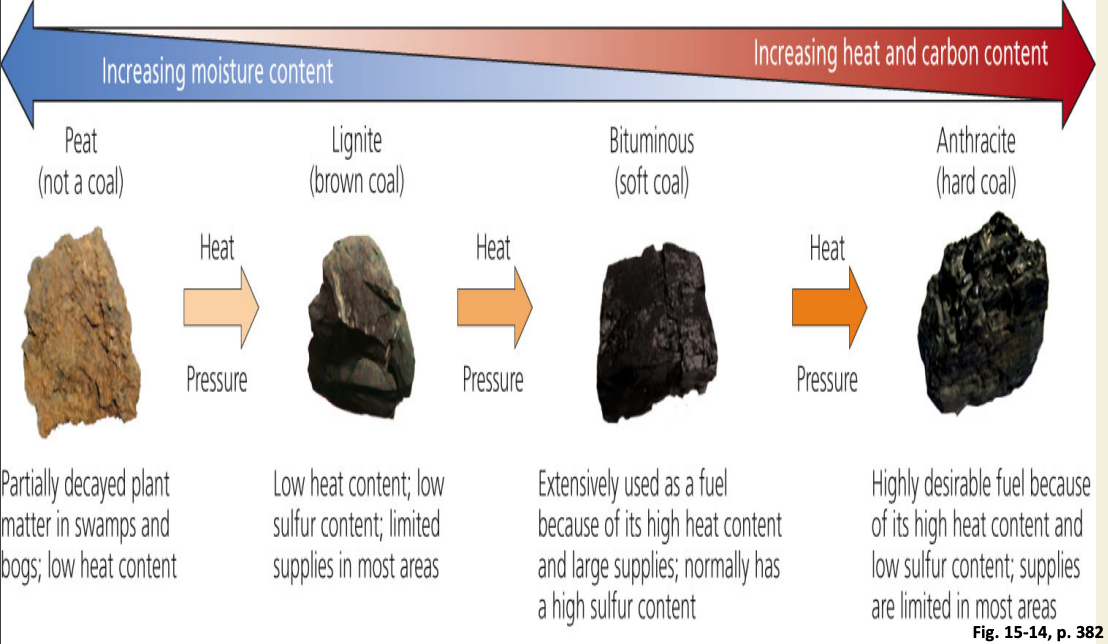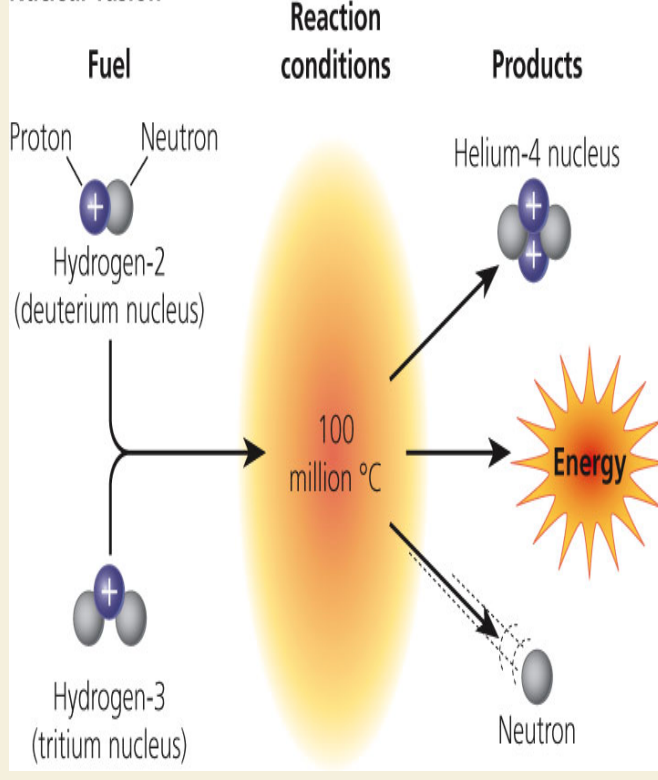Chapter 15: Nonrenewable Energy
What is Net Energy and Why Is It Important?
The Laws That Govern Energy
- The first law of thermodynamics: It takes high-quality energy to get high-quality points. Pumping oil from the ground, refining it, transporting it.
- The second law of thermodynamics: Some high-quality energy is wasted at every step
Basic Science: Net Energy Is the Only Energy That Really Counts
- Net Energy: Total amount of useful energy available from a resource minus the energy needed to make the energy available to consumers
- Business net profit: Total money taken in minus all expenses
- New energy ratio: ratio of energy produced to energy used to produce it
- Conventional oil
- high net energy ratio
Energy Resources With Low/Negative Net Energy Yields need Marketplace Help
- Cannot compete in open markets with alternatives that have higher net energy yields
- Need subsidies from taxpayers
- Ex. Nuclear power
Reducing Energy Waste Improves Net Energy Yields and Can Save Money
- 84% of all commercial energy used in the U.S. is wasted
- 43% after accounting for the second law of thermodynamics
- Make buildings energy efficient, drive efficient cars, not gas guzzlers
What Are the Advantages and Disadvantages of Oil?
How Does Oil and Natural Gas Form?
Fracking: High-pressure pumps shoot a mixture of water, sand, and chemicals into the well; the pressure builds up and creates cracks so that the oil/natural gas can flow up to the surface
Ocean
- Tiny sea plants and animals died and were buried on the ocean floor. Over time, they were covered by layers of slit and sand
- Over millions of years, the remains were buried deeper and deeper. The enormous heat and pressure turned them into oil and gas.
- Today, we drill down through layers of sand, silt, and rock to reach the rock formations that contain oil and gas deposits
Oil Dependence
- Petroleum, or crude oil
- conventional, or light oil
- 1/3 of the commercial world’s energy
- 40% of that used in the USA
- Peak production: the time after which production from a good declines
- Global peak production for all world oil
Refining Crude Oil
- Refining: Heating crude oil to separate it into various fuels and other components with different boiling points in a complex process
- Photochemical: Products of oil distillation, raw materials for industrial organic chemicals
- Pesticides
- Paints
- Plastics
- Petrochemicals: the 2% of the products of refining; used for raw materials to make industrial organic chemicals, cleaning fluids, pesticides, plastics, synthetic fibers, paints, medicines, cosmetics, ice cream, and many other productT
Oil Reserves
- Proven oil reserves: Identified deposits that can be extracted profitably with current technology
- Unproven reserves
- Probable reserves: 50% chance of recovery
- Possible reserves: 10-40% chance of recovery
Conventional Oil
- Advantages
- Ample supply for several decades
- High net energy yield but decreasing
- Low land disruption
- Efficient distribution system
- Disadvantages
- Water pollution from oil spills and leaks
- Environmental costs not included in market price
- Releases CO2 and other air pollutants when burned
- Vulnerable to international supply interruptions
Heavy Oils from Oil Shale and Tar Sand
- Advantages
- Large potential supplies
- Easily transported within and between countries
- The efficient distribution system in place
- Disadvantages
- Low net energy yield
- Releases CO2 and other air pollutants when produced and burned
- Severe land disruption and high water use
What Are the Advantages and Disadvantages of Using Natural Gas?
Natural Gas Is a Useful and Clean-Burning Fossil Fuel
- Natural gas
- a mixture of gases
- 50-90% is methane -- CH4
- Conventional natural gas
- Pipelines
- Liquefied petroleum gas (LPG): When propane and butane gases are liquefied under high pressure
- Liquefied natural gas (LNG): Low net energy yield and makes the U.S. dependent upon unstable countries like Russia and Iran
Is Unconventional Natural Gas the Answer?
- Coal bed methane gas
- In coal beds near the earth’s surface
- In shale beds
- High environmental impacts or extraction
- Methane hydrate
- Trapped in icy water
- In permafrost environments
- On ocean floor
- Costs of extraction are currently too high
Conventional Natural Gas
- Advantages
- Ample supplies
- High net energy yield
- Emits less CO2 and other pollutants than other fossil fuels
- Disadvantages
- Low net energy yield for LNG
- Releases CO2 and other air pollutants when burned
- Difficult and costly to transport from one country to another
What Are the Advantages and Disadvantages of Coal?
Coal Is a Plentiful but Dirty Fuel
Coal: solid fossil fuel
Burned-in power plants; generates 42% of the world’s electricity
- Inefficient
Three largest coal-burning countries: China, the United States, and Canada
World’s most abundant fossil fuel
- The U.S. has 28% of proven reserves
Environmental costs of burning coal
- Severe air pollution
- Sulfur released as SO2
- A large amount of soot
- CO2
- Trace amounts of Hg and radioactive materials

Coal
- Advantages
- Ample supplies in many countries
- High net energy yield
- Low cost when environmental costs are not included
- Disadvantages
- Severe land disturbance and water pollution
- Fine particles and toxic mercury emissions threaten human health
- Emits large amounts of CO2 and other air pollutants when produced and burned
We Can Convert Coal into Gaseous and Liquid Fuels
- Conversion of solid coal to
- Synthetic natural gas (SNG) by coal gasification
- Methanol or synthetic gasoline by coal liquefaction
- Synfuels
Synthetic Fuels
- Advantages
- Large potential supply in many countries
- Vehicle fuel
- Lower air pollution than coal
- Disadvantages
- Low to moderate net energy yield
- Requires mining 50% more coal with increased land disturbance, water pollution, and water use
- Higher CO2 emissions than coal
What Are the Advantages and Disadvantages of Nuclear Energy?
How Does a Nuclear Fission Reactor Work?
- Controlled nuclear fission reaction in a reactor
- Light-water reactors
- Very inefficient
- Fueled by uranium ore and packed as pellets in fuel rods and fuel assemblies
- Control rods absorb neutrons
- Water is the usual coolant
- Containment shell around the core for protection
- Water-filled pools or dry casks for storage of radioactive spent fuel rod assemblies
What Is the Nuclear Fuel Cycle?
- Mine the uranium
- Process the uranium to make the fuel
- Use it in the reactor
- Safely store the radioactive waste
- Decommission the reactor
Conventional Nuclear Fuel Cycle
- Advantages
- Low environmental impact (without accidents)
- It emits 1/6 as much CO2 as coal
- Low risk of accidents in modern plants
- Disadvantages
- Very low net energy yield and high overall cost
- Produces long-lived, harmful radioactive wastes
- Promotes the spread of nuclear weapons
Coal vs. Nuclear
- Coal
- High net energy yield
- Very high emissions of CO2 and other air pollutants
- High land disruption from surface mining
- Low cost when environmental costs are not included
- Nuclear
- Very low net energy yield
- Low emissions of CO2 and other air pollutants
- Much lower land disruption from surface mining
- The high cost (even with huge subsidies)
Dealing with Radioactive Wastes Produced by Nuclear Power Is a Difficult Problem
- High-level radioactive wastes
- Must be stored safely for 10,000–240,000 years
- Where to store it
- Deep burial→safest and cheapest option
- Would any method of burial last long enough?
- There is still no facility
- Shooting it into space is too dangerous
Can Nuclear Power Lessen Dependence on Imported Oil & Reduce Global Warming?
- Nuclear power plants: no CO2 emission
- Nuclear fuel cycle: emits CO2
- Opposing views on nuclear power
- Nuclear power advocates
- 2007: Oxford Research Group
- Need a high rate of building new plants, plus a storage facility for radioactive wastes
Are New Generation Nuclear Reactors the Answer?
- Advanced light water reactors (ALWR): Built-in passive safety features
- Thorium-based reactors: Cheaper and safer but research and development are needed
Solutions: New Generation Nuclear Reactors
- Reactors must be built so that a runaway chain reaction is impossible
- The reactor fuel and methods of fuel enrichment and fuel reprocessing must be such that they cannot be used to make nuclear weapons
- Spent fuel and dismantled structures must be easy to dispose of without burdening future generations with harmful radioactive waste
- Taking its entire fuel cycle into account it must generate a net energy yield high enough so that it does not need government subsidies, tax breaks, or loan guarantees to compete in the open marketplace
- Its entire fuel cycle must generate fewer greenhouse gas emissions than other energy alternatives
Will Nuclear Fusion Save Us?
Nuclear fusion: Fuse lighter elements into heavier elements, No risk of meltdown or large radioactivity release
